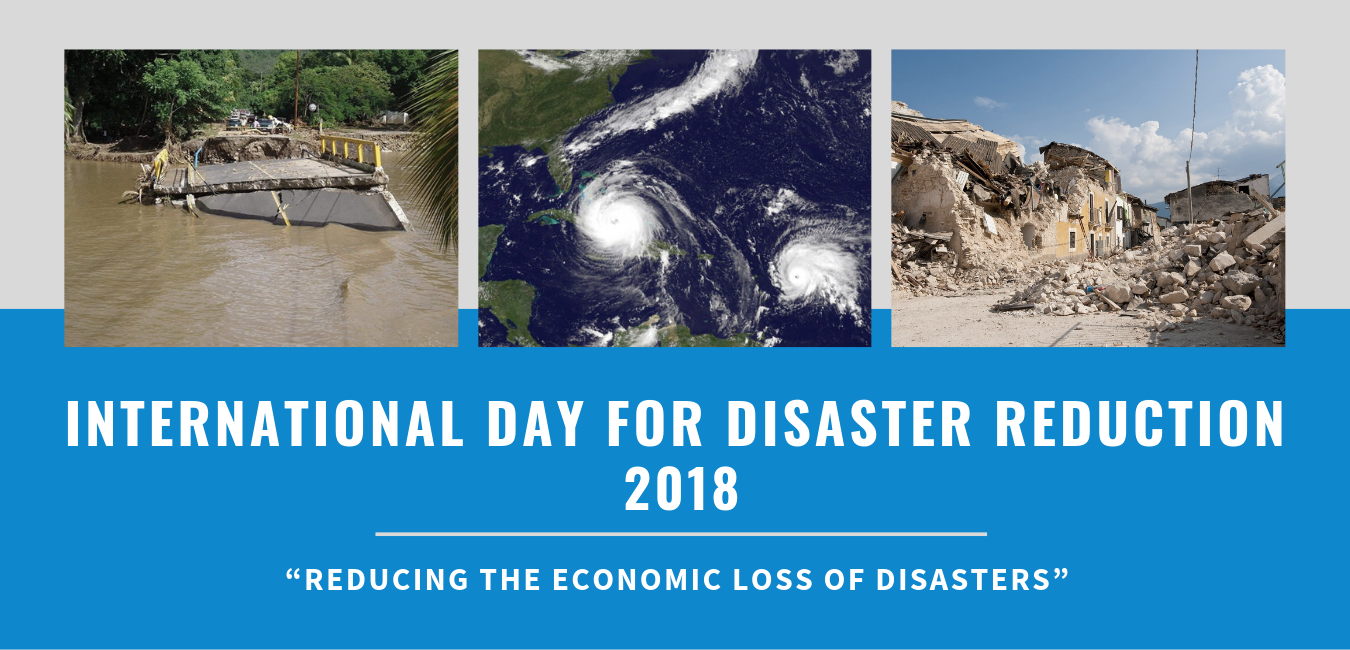LIVING ON THE FRONTLINE: BUILDING RESILIENCE
OECS observes International Day for Disaster Reduction 2018
The Organisation of Eastern Caribbean States joins the global community in observance of International Day for Disaster Reduction (IDDR) today, October 13, under the overall theme “Reducing the economic loss of disasters.”
The Eastern Caribbean region is highly vulnerable to natural disasters including volcanic eruptions, tsunami, earthquake and tropical cyclones.
In recent years, and decades, the region has been severely impacted by numerous hurricanes and volcanic eruptions. Less than one month ago, the passage of Tropical Storm Kirk through the region was directly shadowed by a 5.6 magnitude earthquake, felt in several OECS Member States, and a further 5.9 magnitude earthquake in Haiti – which to date has left fifteen dead and over three hundred seriously injured.
A recent report released by the United Nations Office for Disaster Risk Reduction in Geneva discovered that at least 91 per cent of the disasters that occurred between 1998 and 2017 were climate-related.
According to the report, the most frequent type of disasters were found to be floods, storms and earthquakes. With 3,148, 2,049 and 563 occurrences respectively in the last two decades.
The study revealed, however, that while the absolute economic losses might be concentrated in high-income countries, the human cost of disasters falls on low- and lower-middle income countries.
“In absolute terms, lower-middle income countries suffered the highest number of deaths due to disasters over the past 18 years.”
“In low income countries, an average of 130 people died per million compared with just 18 in high income countries.”
“That means people exposed to disasters in the poorest nations were more than seven times more likely to die than people in the richest nations.”
The report further stated, “Disasters are a major contributor to entrenched poverty in low- and middle-income countries attempting to recover from extreme weather events amplified by the effects of climate change.”
Speaking on this year's theme, UN Secretary General António Guterres stated,
"Disasters have a steep human cost. Millions of people are displaced every year, losing their homes and jobs because of extreme weather events and earthquakes."
"Reducing the economic losses from disasters has the power to transform lives and contribute greatly to the eradication of poverty. As we mark the International Day for Disaster Reduction, let us reaffirm our commitment to this vital endeavour."
In recognition of IDDR 2018, the OECS Commission in Saint Lucia has dedicated the week of October 15 – 19, 2018 to disaster awareness with a specific focus on increased resilience.
One of the main activities planned for the week is a live/virtual symposium jointly organised by the OECS Commission with the Caribbean Public Health Agency (CARPHA), Helen Television System, Sir Arthur Lewis Community College and the University of the West Indies Open (UWI) Campus on the subtheme: "Living on the Frontline: Building Resilience."
The event will be held at the UWI Open Campus Auditorium, Morne Fortune on Wednesday, October 17th 2018 from 10:00am to 12:00pm and will feature speakers from several of the aforementioned institutions as well as from the Government of Montserrat and the Caribbean Disaster Emergency Management Agency (CDEMA).
About the International Day for Disaster Reduction
The International Day for Disaster Reduction (IDDR) was started in 1989, after a call by the United Nations General Assembly for a day to promote a global culture of risk-awareness and disaster reduction. Held every 13 October, the day celebrates how people and communities around the world are reducing their exposure to disasters and raising awareness about the importance of reining in the risks that they face.
The 2018 IDDR theme continues as part of the "Sendai Seven" campaign, centred on the seven targets of the Sendai Framework. This year focuses on Target C of the Sendai Framework, reducing disaster economic losses in relation to global GDP by 2030.


.png)





